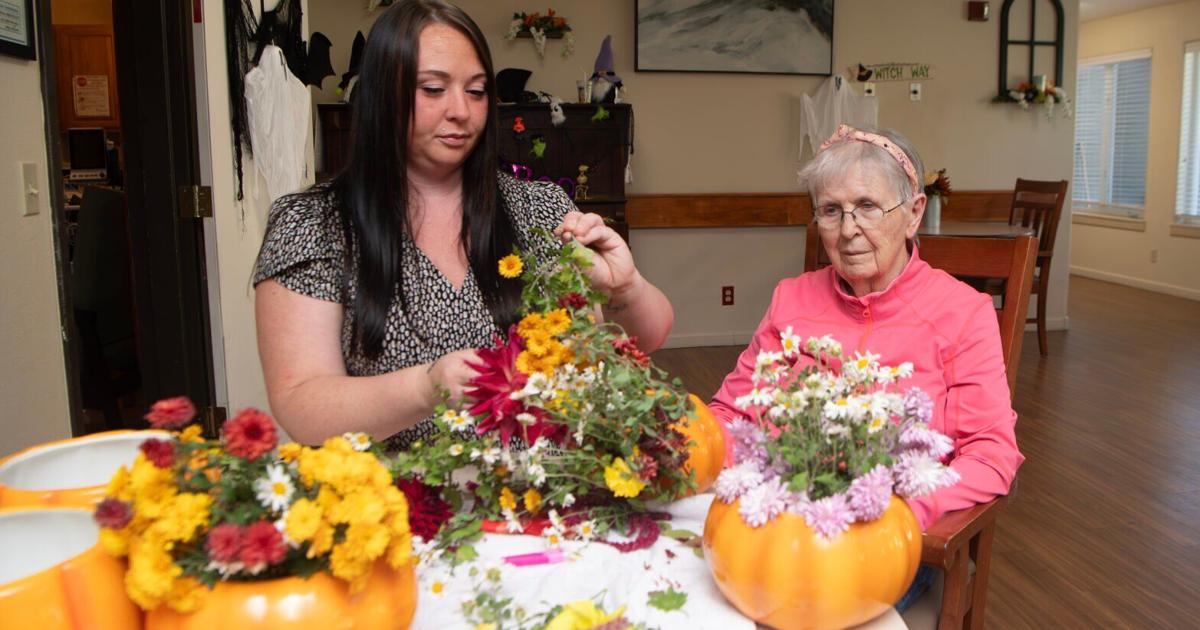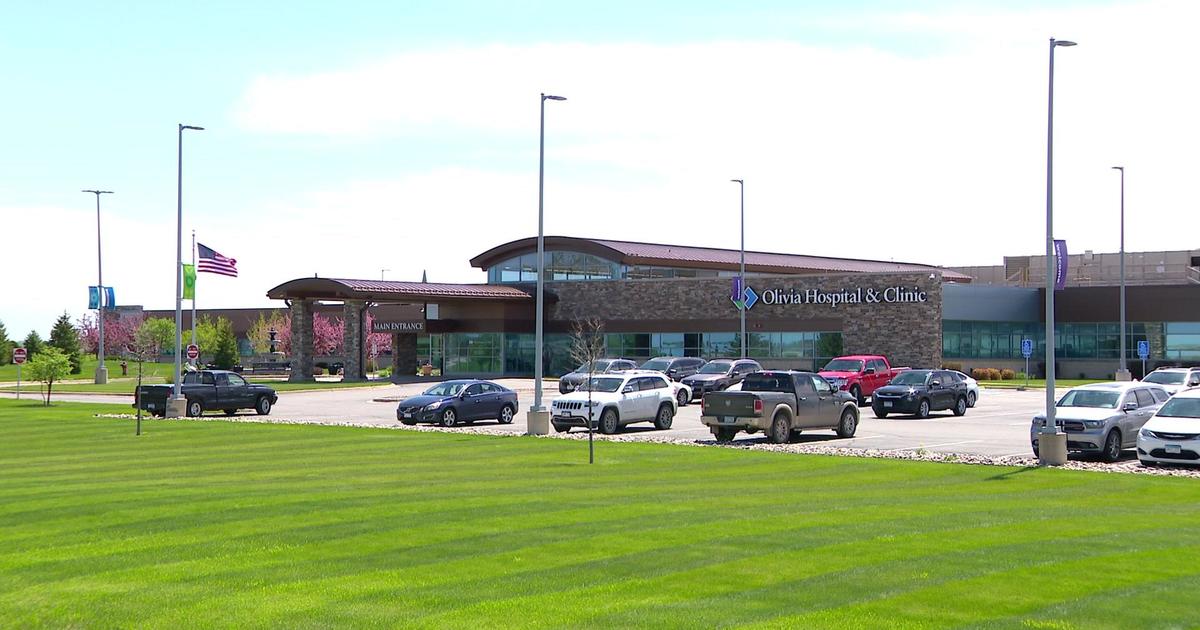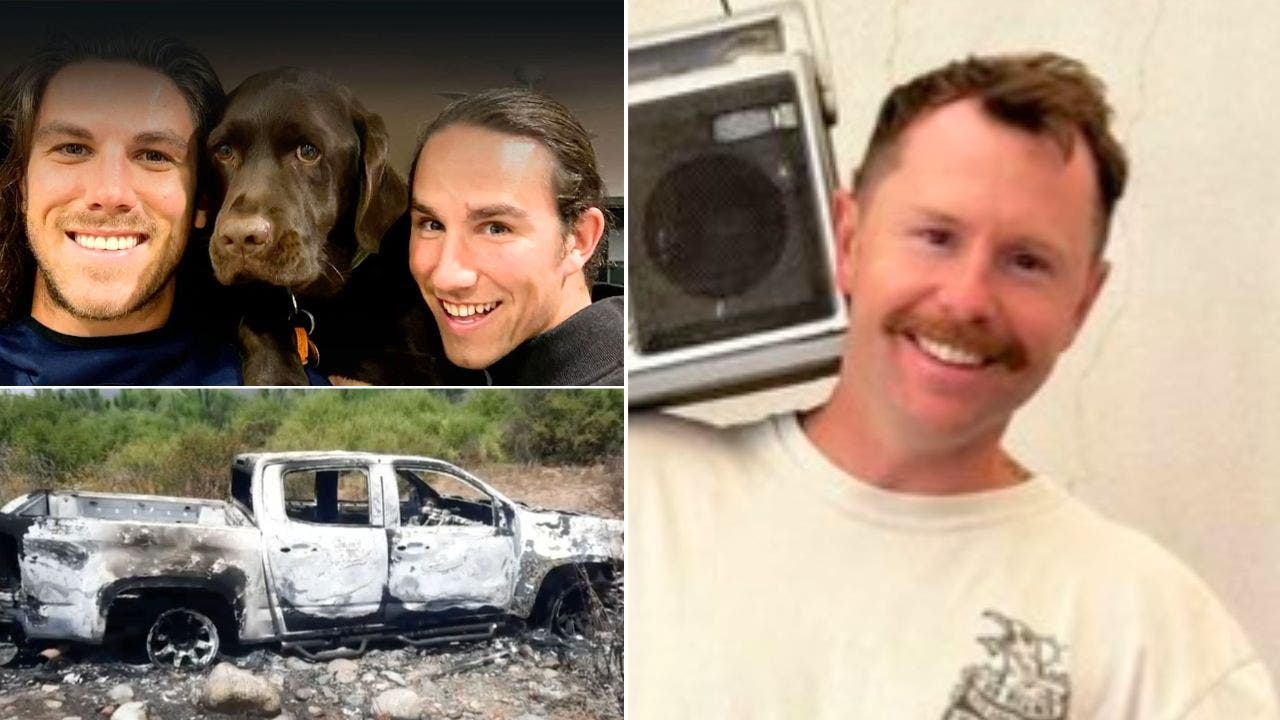Jennifer’s deep wrinkles stretch into a smile as she takes the hand of a stranger. Her skin is thin and her fingers cold, but she grins from ear to ear as she whispers, nearly inaudibly, that she is going to find her sister, Paula. Jennifer is a resident at an assisted living facility in Billings where she resides with others who have dementia or Alzheimer’s.
She took a few more shuffling steps into the TV room at Edgewood Senior Living and looked around at the other residents. Some were laid back in recliners, snoozing under knitted blankets.
Through a communal dining area, another woman arranged fresh flowers in a festive vase for Halloween, but an apathetic expression shadowed her face. Behind her were French doors that let the natural light stream in, but if she decided she wanted fresh air, she wouldn’t be able pull the locked handle down herself.
People are also reading…
Edgewood’s Dez Ausen helps resident Norrine Lunde create floral arrangements during activities at the facility on Thursday, Oct. 19.
Kelsey Miller, director at the memory care facility, tapped in a code on a pin pad before swinging the doors open into a fenced, horseshoe shaped courtyard. Wandering tendencies in those with cognitive decline means tight security and supervision is needed 24-hours a day, a service most institutionalized care facilities cannot provide.
As the workforce shortages continue in Montana and a silver wave of baby boomers washes over the rural state, patients with high-care needs are often turned away from residential care facilities. And when this happens, the U.S. health system relies on families to take on the responsibility of caring for injured or sick loved ones, usually without any training or support whatsoever.
A survey by AARP found that while caregiving comes with feelings of fulfillment, it also carries significant burdens that affect the mental, emotional and physical wellbeing of the caregiver. Nearly 40% of unpaid family caregivers report high emotional stress due to their caregiving duties.
Montana’s families and local providers are doing everything they can, including testifying at the State Legislature, to convey the dismal impacts of having an insufficient long-term care infrastructure, especially as policymakers are encouraging a societal shift away from institutionalized care.
While legislators voted in a historical investment in Medicaid services, other investments in long-term care and home health were bypassed.
Now, advocates both locally and nationally are encouraging lawmakers to use the interim period before the 2025 session to come up with creative and economic solutions to support aging in place.
One of these solutions could be adult day services, also referred to as adult daycare (ADC), local providers said. ADC is an underutilized and largely unknown tool that aims to ease isolation and loneliness in seniors while giving caregivers the opportunity to take a break.
But the handful of ADC services in Montana are unevenly distributed across the state, disconnected and vary drastically in cost. Providers interviewed for this article asked about what other ADC services exist, having never heard about programs other than their own.

The lobby of Edgewood Memory Care is seen on Oct. 19.
What’s gained at ADC
Marian Permann has become accustomed to hearing the overwhelming anxieties of caregivers. As the director of the adult daycare services at Easter-Seals Goodwill in Great Falls, she simultaneously welcomes new clients while trying to calm the caregivers who arrive with strong feelings of inadequacy.

Permann
“She said ‘I feel like I’m letting him down. I can’t do things for myself and I can’t take him with me,’” Permann said of one woman who was launched into the role of nurse after her husband had a stroke.
When he could no longer be left at home alone, a one-hour trip to the grocery store turned into multiple stress-filled hours as she did her best to keep him on track, Permann said.
Dropping off a beloved spouse at a daycare service is loaded with guilt and shame, and the woman was hesitant to leave her husband at EasterSeals-Goodwill, unsure if she was making the best choice for him.
But social isolation among seniors can influence whether older adults develop dementia and can accelerate cognitive decline, according to an article published in Journal of the American Geriatrics Society.
Permann, trained as a recreation therapist at the University of Montana, knows how important it is to engage and challenge the brain during late stages of life. She starts her clients out every day with coffee and a discussion. Sometimes they talk about what’s happening in the news or what’s going on in their personal lives.
“We have some ladies with dementia who like to sit together. You have no idea what they’re talking about, and they acknowledge that and just laugh,” Permann said. “But they’re getting that social interaction that’s so important.”
There are light exercise classes that focus on mobility, music classes, walks outside and a therapy dog for those who may be having a hard day. The EasterSeal-Goodwill team has invested in specialized training for new employees on caring for those with dementia, education caregivers rarely get.
The woman who hesitantly dropped her husband off at EasterSeals-Goodwill returned a few hours later to find him sitting in a drumming circle, smiling and laughing during the daily music program. He had so much fun in fact that he wasn’t ready to go home, Permann laughed.
“There’s a culture of ‘I can do it on my own,’” Permann said. “But to be a good caregiver you have to take care of yourself.”
Accessibility
In Montana, there has been a huge surge in demand for home care that ranges from respite care, in which a vetted employee or volunteer spends a few hours in the home while the caregiver goes out, to home health providers who administer critical care or support activities of daily living in the home.
For the first time, more than half of Medicaid long-term support service spending went to home and community based services, up from 37% in 2009, according to Montana AARP.
Medicare, the federal health insurance for those over 65, does not cover home and community based services.
Those eligible for Medicaid, the social insurance for people with little to no money, could access services through a Medicaid waiver program after sticking it out through a hefty waitlist. Usually when seniors become eligible for Medicaid they’ve spent down a lifetime’s worth of savings.
There are many families that fall between the cracks, making too much money to be eligible for Medicaid but are unable to afford the average annual cost of home care, which came to $42,000 per person in 2021. Montana ranks 42nd in the country for affordability, according to AARP data.
The hourly rate for one of Permann’s clients is set at $12 per hour. EasterSeals-Goodwill is happy to accept Medicaid waivers, private insurance when it is applicable and private pay.
Permann is able to take anywhere from 12 to 20 clients a day, depending on their staffing. The program is technically licensed for 30 clients, but Permann said they would resist taking on that many without more staff members.
Other providers around the state aren’t nearly as accessible.
Edgewood Senior Living in Billings is licensed for ADC, but with 25 live-in residents, Miller is only able to accept up to three seniors at a time. And to make ends meet at the mostly private pay facility, it costs $20 per hour.
The ADC services Miller offers mostly serve as a way for potential residents to transition to institutionalized care. St. John’s United in Billings offers similar transitional support, but is not able to offer ADC services beyond this.
Miller sees an expansion of ADC services as a way to better support aging at home.
“If you don’t work in (aging or memory care) you don’t understand it. It makes it hard for people to see if they don’t deal with it every day or if you don’t have a family member going through it,” Miller said.

Edgewood Memory Care Executive Director Kelsey Miller is photographed at the facility on Oct. 19.
Montana falls behind
Despite being the sixth oldest state in the country, Montana has lost ground in long-term service and supports. Gaps in quality, choice and affordability have widened since the pandemic began, knocking Montana down in rank to 33rd in the country for long-term care support. The last time AARP released these rankings was in 2021 when Montana was 27th in the country.
Likely compounded by the closure of 11 rural nursing homes in 2022, Montana ranks 40th in the U.S. for its options — how and where one chooses to consume senior specific health care.
During the year of closures, Republican Gov. Greg Gianforte pointed to data from Montana AARP that showed most Montanans would prefer to age at home rather than in an assisted living or nursing home facility.
Senior services, caregiver support and home health care are predominantly concentrated to Montana’s metropolitan areas, leaving rural communities, which are often the oldest, with hardly any care options at all, said Mike Larson, executive director of Adult Resource Alliance in Billings.
But Larson is hesitant to lean into ADC services as the answer to aging supports because of the funding model developed from the Older Americans Act.
The state is split up into 10 area agencies on aging, a result of the 1965 Older Americans Act, to create structures at the federal, state and local level, making it possible to designate funding and develop programs for the nation’s elderly.
Montana’s agency budgets are broken down into highly specific categories, but none of those categories are earmarked for adult day care services.
“We’d have to start from the bottom up,” Larson said of adding ADC to the current funding model. “To pay for a service like that you would be taking away from something else.”
Federal contribution comes in at a fixed rate and is determined by population. The low census in Montana means the state receives $7 million annually, a far cry from Florida’s $115 million.
So, securing additional funds would require legislative action to pull money from the general fund, a feat that has traditionally be hard to accomplish for long-term care services.
Instead, Larson’s focus is on hyper-local community engagement. Getting local churches on board with developing caregiving programs, for example, could be one way to address the lack of resources in Montana.
But still, there are challenges in getting organizations on board with senior health services, in part, Larson said, because of how we view aging as Americans.
“There will always be that attitude, I think, that’s hard to overcome, is that these are adults. And they have some responsibility and ability to take care of themselves,” Larson said. “We’re still working to get to that place from a cultural standpoint that we see the vulnerability of that older person the same way we see children as being vulnerable.”












/cdn.vox-cdn.com/uploads/chorus_asset/file/25441105/20240430_Holographic_AR_Displays_N6A1077.jpg)


















